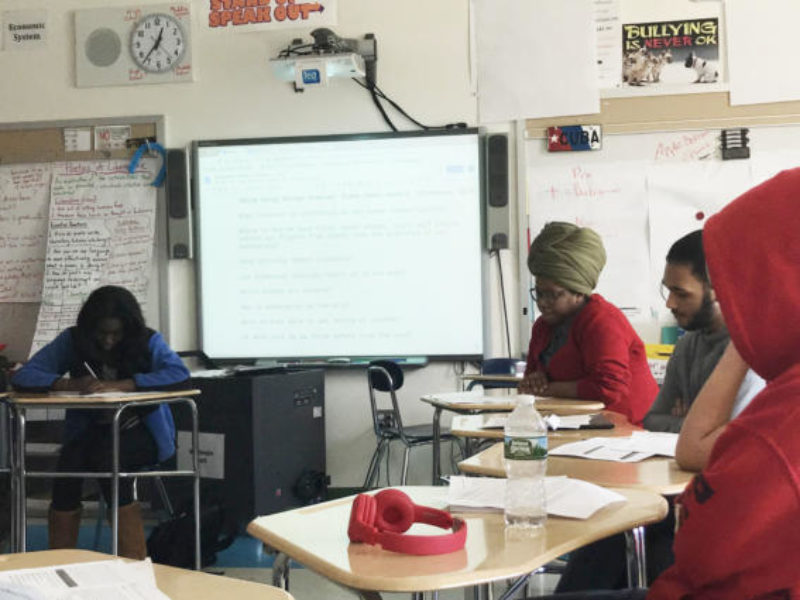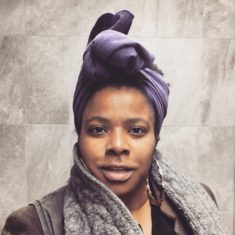Through the generous support of Poets & Writers, The Center for the Humanities, at the Graduate Center, CUNY was able to add another chapter to our ongoing work of fostering meaningful connection with organizations in our surrounding community. Our collaborations with Alex Cuff have steadily branched into a series workshops and panels, hosted by Raven Press, a publishing collective based out of the Academy for Young Writers.
This spring, we invited Adjua Greaves—a poet who has also worked with The Poetry Project and is immersed in a wide network of New York Poets--to lead a workshop for students at Academy of Young Writers. Below are two reflections on Greaves’ class visit, one by Lost & Found Managing Editor Stephon Lawrence and the other by student Gyjah Powers.
Stephon Lawrence
Adjua Greaves began her workshop with an introduction, where she spent some time becoming more familiar with the students. Recognizing that it can be jarring for a class workshop to be led by a mid-semester visitor, Adjua took this time to thank the students for their presence and for their thoughtful responses to her poems “Sianto stati mostri. (Flatbush 2017)” and “Art is Service” which had been provided by the poet prior to the workshop meetings. Adjua spoke to the students about how important and rare it is to receive such careful treatment of one’s work as you become more established as a poet. People tend to begin responding to your work as one body, rather than giving each individual piece such close study. In hearing this the students’ energy visibly rose—it was clear how important it was for them to know that their thoughts and comments were more than just an assigned task, and that they were being taken seriously from the very beginning.
This was followed by a short reading of these pieces by Adjua, allowing the students to experience the poems performed, and explore how the delivery of words can transform a poem, as well as how delivery differs from poet to poet, opening them up to the possibility of discovering a performance style that best suits their writing style, and the message they want to convey.
The workshop then moved into an open discussion about some of the themes and imagery students found in Adjua’s poetry—most notably, the concept of time and its passing. One student—the first to speak—posed that time is entirely a man-made concept rather than something real and tangible. He placed emphasis on time being a learned behavior and not something we are instinctually born with. This led the class to discuss the ways we have collectively, as humans, decided to follow the constraints of time and how so often those constraints make little sense. Another student pointed out that Daylight Savings is not recognized everywhere. She asked, “Why do we change time when everyone else stays the same?” to which Adjua responded, “Yes, that’s exactly right!”
Providing students the space to ask questions—any questions they pleased—opened them up to a new way of thinking through commonly faced problems via poetic practice. In Adjua’s poem, “Siamo stati mostri. (Flatbush 2017),” she asks “What violence to interbeing is the human classification?” / …Does thriving demand predation? /…Which humans are animals?” This got the class thinking about issues of race, class, age, the use of language and who is most affected by the word “animal,” and the innate power words hold. Adjua also conveyed to the students the importance of giving oneself the time and space to create and think creatively as often as possible, if not every day.
Following the discussion, the workshop culminated in a short writing exercise which asked the students to use their surrounding imagery to convey the passage of time and then end with the asking of a question. Many culled their imagery from classroom objects—a cactus on the windowsill, the ticking wall clock, shifting chairs—while others focused on more outward-facing images—running for a bus, sunrise, standing on a subway platform. The questions they posed as an end to their short poems were also of note, and seemed to be what the students were most eager to share. The questions were often met with agreeance and laughter, and ranged from “Do you feel wealthier, the more time you allow yourself?” to “If a person has short term memory loss, how do they remember that they have the disease?” It was on this note that Adjua concluded the workshop and the students expressed their thanks.
Gyjah Powers
Adjua coming to our school as a guest speaker was an event I appreciate as an aspiring writer. She was able to reflect on her published writing with teens in my group and wasn’t shy of constructive criticism. Adjua’s appearance grabbed me; her headwrap and glasses presented more attention to her face, which every person focused on. Very classy and not so out there. Even though the class wasn’t that long, I learned that even published poets take all constructive criticism into consideration no matter the age difference or maturity level (from what I’ve seen so far at least). Poets coming to our school lets children know that they can go places with the little pieces of work they joke about or don’t take seriously. Everyone has potential and should do their best to achieve it. Having people who have been acknowledged on different levels come to our school lets us know that they’re human, they don’t avoid society, they live lives just like us.
Here’s a piece written during the circle:
It actually does wait
Consisting of the same image 5 minutes ago
Or was it 10?
Using movement of our surroundings
To indicate something new
But why if…
Nothing changed
What time would it be then?


